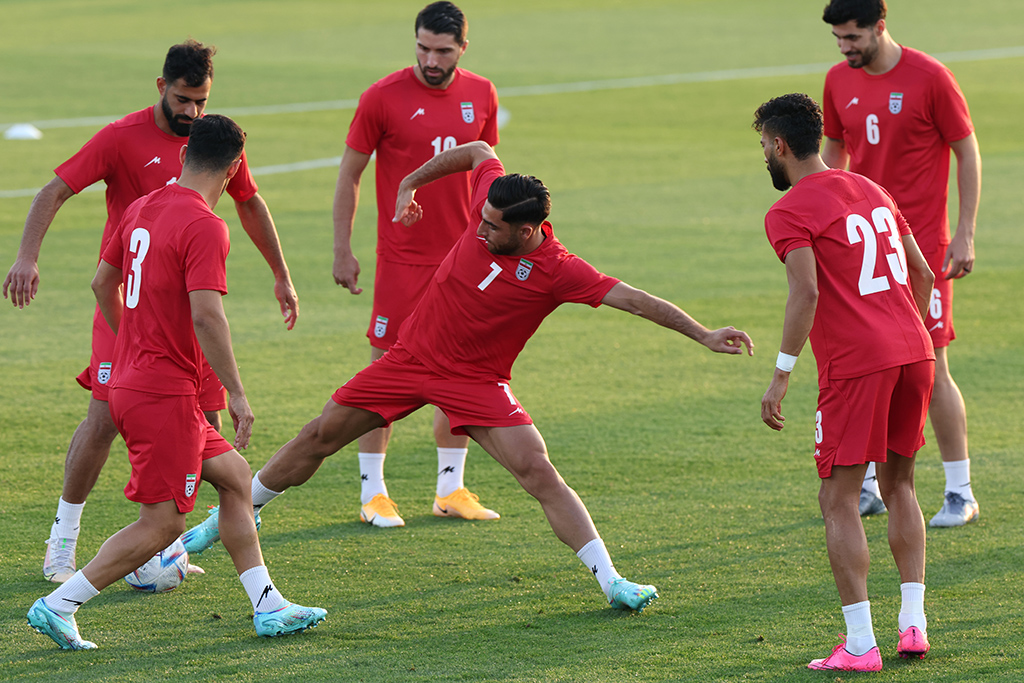DOHA: Iran’s opening World Cup match against England on Monday is likely to be overshadowed by a deadly crackdown on women-led protests back home. The football-obsessed nation of 80 million people is normally united by football but is reeling after two months of nationwide protests since the death of Mahsa Amini in morality police custody on September 16.
Amini, a 22-year-old Iranian of Kurdish origin, died three days after her arrest in Tehran over an alleged breach of the Islamic republic’s dress code for women, which includes the mandatory hijab headscarf. The crackdown since Amini’s death has left nearly 400 people dead, according to Oslo-based group Iran Human Rights. The state’s response has led to questions over whether the team represents Iran or the regime that has ruled with an iron fist since the Islamic Revolution of 1979.
Players have faced calls from activists to use the World Cup to show solidarity with those killed during the protests, with attention on the playing of national anthems and celebrations. Team captain Alireza Jahanbakhsh said Thursday that the players were focused on the “biggest games of our lives”, not the politics of the protests. “What I’m trying to say is we are here to play football and that’s the main thing everybody is focused on while we’re here,” said the Feyenoord winger. Iran’s squad boasts several stars who have played in Europe’s top leagues and a respected coach in Carlos Queiroz of Portugal.
‘Personal’
Asked whether the players would join other Iranian sports figures who have refused to celebrate their victories as a form of support for the protests, Jahanbakhsh said that was “something very personal”. “Every single player has a different celebration and you ask about the national anthem and that’s something that also has to be decided in the team,” he said. In a World Cup warm-up game against Senegal in September, star striker Sardar Azmoun scored, but commentary focused on his muted celebration rather than his performance.
The entire team had remained wrapped in their black tracksuits during the pre-match anthems rather than exposing the national strip. In another friendly, against Nicaragua earlier this month, just two players sang the national anthem—Vahid Amiri and Mehdi Torabi. The rest stood in silence. Asked for his view on the singing of the anthem, coach Queiroz said the players had the “right to express themselves”.
Before the Senegal game, protesters gathered outside the stadium in Austria pleading with the players to come out and express their support. “We are here to just beg (the team) - please support us instead of standing against us,” said one of the organizers, Mehran Mostaed. “Sure there are consequences for a football player to express support... but for sure they have to face the consequences.” Earlier in the week, Iranian football bloggers had taken screenshots of an Instagram post from Azmoun saying that because of “restrictive rules... I could not say anything”.
But he said he could not remain silent. “This will never be erased from our consciousness. Shame on you!” he wrote. The post was deleted and the entire content of the Instagram account, followed by five million people, disappeared for days. The account was later restored, and the Bayer Leverkusen striker appeared to apologize for his earlier post. One of the biggest names in Iranian football, former national team star Ali Karimi, has become a hero to many protesters with his vociferous support on social media.
Former Iran goalkeeper Sosha Makani has gone further, demanding a ban on the team taking part in the World Cup. “It’s the Islamic republic’s team not the Iranian people’s team. FIFA should ban it,” Makani said. In Qatar, several Iran-based players have offered their condolences to the families of those killed, but they have stopped short of voicing support for the protests. “I would like to extend my condolences to the families who have lost loved ones during the recent events and I would like them to know we are by their side,” said reserve ‘keeper Hossein Hosseini.
Coaches summoned
Meanwhile, the coach of one of Iran’s best-known football teams is among eight celebrities and politicians interrogated for their comments about protests which have shaken the country, the judiciary says. Yahya Golmohammadi, coach of Persepolis FC, was questioned along with two former reformist members of parliament, Mahmoud Sadeghi and Parvaneh Salahshouri, about “the publication of non-documented or offensive content,” the judiciary’s Mizan Online website said late Saturday.
Golmohammadi has strongly criticized players of Iran’s national team for not “bringing the voice of oppressed people to the ears of the authorities.” The comment came after Iran’s national team last week met President Ebrahim Raisi ahead of their appearance in the World Cup which begins Sunday in Qatar. The Islamic republic has been rocked by protests since the September 16 death in custody of Mahsa Amini, a 22-year-old Iranian of Kurdish origin, after her arrest for an alleged breach of Iran’s dress rules for women.
Thousands of people have been arrested after what officials call “riots” which they allege have been fomented by foreign enemies. The two ex-MPs have used Twitter to support the protests and have denounced authorities’ use of force against demonstrators. According to Mizan, five actresses including Mitra Hajjar and Baran Kosari were also summoned, for publication of “provocative content.”
“Following comments written without proof on the recent events, as well as the publication of provocative material in support of these riots by political personalities and celebrities,” the eight individuals were called in on Saturday by Tehran’s public prosecutor, Mizan Online said. On Sunday the Instagram accounts of Golmohammadi and Kosari were no longer available online. Prominent Iranian ex-footballers have voiced support for the protesters, and national team players have faced calls from activists to use the World Cup to show solidarity with demonstrators who have been killed. - AFP











